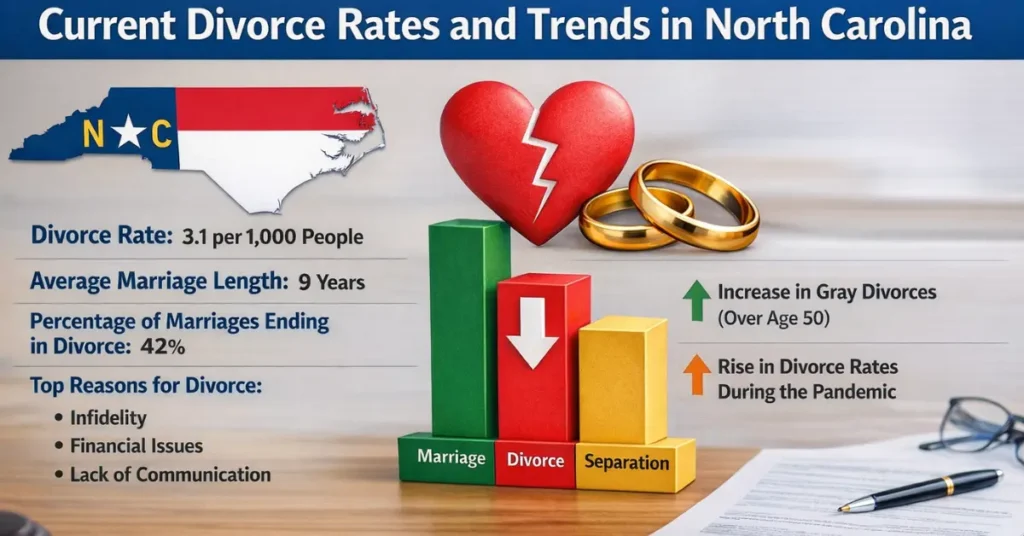Divorce is a major life event that affects millions of families across the United States every year. Over time, divorce rates have shifted due to changing social attitudes, economic pressures, and evolving family laws.
Looking closely at divorce rates in North Carolina helps explain how marriage and separation trends are shaping family life within the state. These statistics do not just represent numbers. They reflect real changes in relationships, financial stability, and household structures.
This article examines North Carolina divorce statistics, explores what factors influence these rates, and explains how divorce affects families and communities today.
Overview of Divorce in North Carolina
Divorce is legally defined as the termination of a marriage by a court. In North Carolina, specific legal conditions must be met before a divorce can be granted.
Most divorces require spouses to live separately for at least one year before filing. This separation period is a defining feature of divorce in North Carolina and plays a major role in shaping divorce timelines.
Compared with national patterns, North Carolina’s divorce rate closely mirrors broader U.S. trends, though local economic conditions and population growth influence how these numbers fluctuate over time.

Current Divorce Rates and Trends in North Carolina
Recent data shows that North Carolina’s divorce rate has gradually declined compared to earlier decades. In recent years, the rate has averaged around 2.7 to 2.9 divorces per 1,000 residents, reflecting a steady downward trend.
A review of divorce data from the past decade shows that rates peaked around 2010 and have generally decreased since then. This pattern aligns with national declines in divorce, often linked to delayed marriage, higher education levels, and increased cohabitation without marriage.
Family law experts, such as Joan B. Kelly, emphasize that these trends reflect broader social changes. Kelly notes that “as marriages occur later and educational attainment rises, we see more stable unions and a corresponding decline in divorce rates in states like North Carolina.”
Demographic and Socioeconomic Factors Influencing Divorce in NC
Divorce rates in North Carolina are not evenly distributed. Several demographic and socioeconomic factors strongly influence marital outcomes, even under legal requirements such as the North Carolina 12-month divorce rule, which affects when couples can formally separate.
Age
Couples who marry at younger ages, particularly in their late teens or early twenties, statistically face a higher risk of divorce. Younger couples often experience financial instability and limited relationship experience, which can strain marriages.
Gender
Women continue to initiate divorce more frequently than men. Court observations and family law studies suggest that emotional disconnect and lack of long-term support are common contributing factors cited by women.
Income Level and Education
Education plays a significant role in marital stability. In North Carolina, couples with college degrees tend to divorce at lower rates than those with less formal education. Economic stress, job insecurity, and debt are frequently linked to higher divorce risk.
Urban vs. Rural Residence
Urban areas such as Charlotte, Raleigh, and Durham consistently show higher divorce rates than rural regions. Urban lifestyles often involve higher living costs, work stress, and social mobility, which can impact long-term relationships.

Common Reasons for Divorce in North Carolina
The reasons couples divorce in North Carolina largely reflect national patterns, with several recurring themes.
Financial Issues
Money-related stress remains one of the leading causes of divorce. Job loss, debt, and unequal financial responsibility often lead to conflict that becomes difficult to resolve.
Infidelity
Infidelity continues to be a major contributor to divorce. The breakdown of trust following betrayal often leads couples to seek permanent separation.
Compatibility Issues
Differences in values, life goals, or communication styles frequently result in long-term dissatisfaction. When these issues remain unresolved, divorce becomes more likely.
Socio-Economic Pressures
Broader economic pressures, including housing costs and healthcare access, can intensify marital strain. These challenges are especially visible in fast-growing areas of North Carolina.
Impact of Divorce on Families and Society
Divorce affects more than just spouses. Children, extended families, and communities often experience lasting effects, including concerns related to emotional well-being and the cost of child custody lawyer involvement during legal disputes.
Research consistently shows that children of divorced parents may face:
- Emotional stress
- Academic disruption
- Behavioral challenges
At the community level, divorce contributes to increased demand for housing, social services, and legal resources. Over time, high divorce rates can influence neighborhood stability and economic resilience.

Legal Process and Support Resources for Divorce in NC
Understanding the legal process helps individuals prepare for divorce more realistically.
Overview of the Divorce Process
North Carolina divorce cases typically follow several steps.
Filing Requirements
At least one spouse must be a North Carolina resident for six months before filing.
Separation
Spouses must live separately for one full year before seeking a no-fault divorce.
Grounds for Divorce
Most divorces are filed on no-fault grounds, though fault-based claims may still affect financial outcomes.
Mediation and Other Legal Considerations
Mediation is commonly used to resolve disputes involving custody, property division, and support. Courts often encourage mediation before trial.
Available Support Systems
Several support resources are available to families navigating divorce.
Counseling Services
Therapy and counseling help individuals manage emotional stress and make informed decisions.
Family Support Services
Community organizations assist families with parenting adjustments and post-divorce transitions.
Legal Aid Services
Legal aid programs provide assistance to individuals who cannot afford private representation.
North Carolina-Specific FAQs
Under North Carolina marriage laws, divorce outcomes depend on statutory rules rather than personal preference.
In NC, what percentage of marriages end in divorce?
Approximately 35–40%, depending on demographic and economic factors.
Is North Carolina a 50-50 state in divorce?
No. Property is divided using equitable distribution, not automatic equality.
Is North Carolina a no-fault divorce state?
Yes. Most divorces are granted after one year of separation without assigning blame.
Notable Statistics and Trends in the U.S. Divorce Landscape
National divorce rates have also declined over time. The current U.S. divorce rate is estimated at under 15%, reflecting long-term downward trends.
North Carolina’s divorce rate remains close to the national average, neither among the highest nor the lowest in the country.

Which Cities and Counties in North Carolina Have the Highest Divorce Rates?
Urban regions continue to show higher divorce rates.
- Charlotte – Larger population and younger demographics
- Wake County – Rapid growth and economic pressure
- Mecklenburg County – Urban lifestyle factors
- Durham County – Diverse socioeconomic influences
Rural areas generally report lower divorce rates.
North Carolina Divorce Consultation and Legal Support
Individuals considering divorce often benefit from professional guidance. Legal professionals help clarify rights, responsibilities, and realistic outcomes.
Preparing questions, gathering documentation, and understanding timelines can significantly improve the divorce process.
Conclusion
North Carolina’s divorce trends reflect broader national changes while maintaining unique state-specific patterns. Divorce rates have declined, yet economic stress, lifestyle pressures, and relationship challenges continue to shape marital stability.
Understanding divorce statistics, legal processes, and available support systems provides valuable insight for families navigating separation. Awareness and access to resources remain critical in fostering healthier post-divorce outcomes across the state.
Legal Disclaimer
This article is for informational purposes only and does not constitute legal advice. Divorce laws and outcomes vary based on individual circumstances. For guidance specific to your situation, consult a licensed North Carolina family law attorney.




